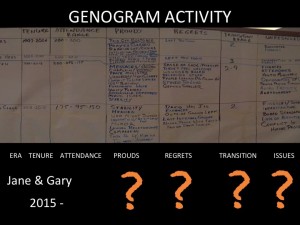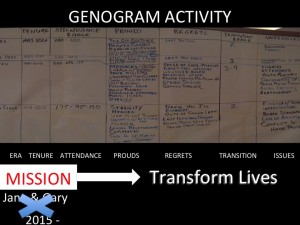 Back in the day when I served as Director of Peacemaking Services for what was then The Association of Unity Churches International, I facilitated a reconciliation process called Making Peace with Our Past. It was very similar to the Genogram Activity I described in a previous blog post with respect to the mapping of regrets and transitional dynamics underlying a ministry’s legacy of unresolved issues. Emotional baggage that was created in one ministerial era is passed down to the next ministerial era. This is an unintended consequence of the family system dynamic associated with the minister-centric model of ministry. The minister, by default, is cast in the role of surrogate parent. Parents can be nurturing, supportive, sympathetic as well as neglectful, controlling, or abusive. The point is that we cannot control people’s projections.
Back in the day when I served as Director of Peacemaking Services for what was then The Association of Unity Churches International, I facilitated a reconciliation process called Making Peace with Our Past. It was very similar to the Genogram Activity I described in a previous blog post with respect to the mapping of regrets and transitional dynamics underlying a ministry’s legacy of unresolved issues. Emotional baggage that was created in one ministerial era is passed down to the next ministerial era. This is an unintended consequence of the family system dynamic associated with the minister-centric model of ministry. The minister, by default, is cast in the role of surrogate parent. Parents can be nurturing, supportive, sympathetic as well as neglectful, controlling, or abusive. The point is that we cannot control people’s projections.
The context of the Genogram Activity is less about healing the past, but more about revealing how a minister-centric context of ministry inevitably creates patterns of dysfunction, hurt and regret. However, simply identifying unresolved issues and becoming conscious of the shadow dynamics within a ministry is insufficient to prevent the re-triggering of past hurts.
 Should Jane and I continue to perpetuate this minister-centric practice of ministry at Unity Spiritual Center, I guarantee that we will contribute to its legacy of unresolved issues. Once the “honeymoon” phase of our tenure is either shattered or fades away (and it always does) we run the risk of disappointing someone, stepping on someone’s sensibilities, pissing someone off, or otherwise falling short of people’s expectations, needs, wants, hopes or dreams. We can’t help but to impact the people we serve. The nature of that impact will depend upon our capacity to be on our Q Card. And, in spite of our best efforts to be mindful, compassionate, understanding, sympathetic, accommodating, integral, truthful, patient, and caring, we will miss the mark from time to time. Our hope is that with the sufficient saturation of people grounded in the Q Process™, we will witness a working through the unconscious material that is projected upon us, and we, in turn, will succeed in refraining from projecting our shadow material on those that inadvertently trigger us.
Should Jane and I continue to perpetuate this minister-centric practice of ministry at Unity Spiritual Center, I guarantee that we will contribute to its legacy of unresolved issues. Once the “honeymoon” phase of our tenure is either shattered or fades away (and it always does) we run the risk of disappointing someone, stepping on someone’s sensibilities, pissing someone off, or otherwise falling short of people’s expectations, needs, wants, hopes or dreams. We can’t help but to impact the people we serve. The nature of that impact will depend upon our capacity to be on our Q Card. And, in spite of our best efforts to be mindful, compassionate, understanding, sympathetic, accommodating, integral, truthful, patient, and caring, we will miss the mark from time to time. Our hope is that with the sufficient saturation of people grounded in the Q Process™, we will witness a working through the unconscious material that is projected upon us, and we, in turn, will succeed in refraining from projecting our shadow material on those that inadvertently trigger us.
Now, it could be said that all relationships are susceptible to wounding and disappointment. Yes, that is true. The issue for me is that the current paradigm of ministry exacerbates unresolved issues in the community and makes it very difficult to evolve the organization to the next level.
In a recent Center Update I told our congregation that Jane and I are subject to the same dynamics our predecessors have experienced–the not so divine inheritance of the ministry’s unresolved issues. I explained that getting to the next level means acknowledging our baggage and looking out for opportunities to integrate, release and heal.
 In addition, in order to break the cycle of reliving the patterns and limiting beliefs that comprise the ministry’s pain body, we need to shift the context of the minister’s influence in the living system–moving from the dynamic of the minister(s) as being the centrism or “parent” unto the congregation, to making the mission or purpose of the ministry define the ministry’s identity. In other words, the role of the minister shifts from being perceived as the system’s primary care-giver, way shower, guru, or the center of attention, to being a partner and coach in the broader context of the ministry in its efforts to fulfill its purpose.
In addition, in order to break the cycle of reliving the patterns and limiting beliefs that comprise the ministry’s pain body, we need to shift the context of the minister’s influence in the living system–moving from the dynamic of the minister(s) as being the centrism or “parent” unto the congregation, to making the mission or purpose of the ministry define the ministry’s identity. In other words, the role of the minister shifts from being perceived as the system’s primary care-giver, way shower, guru, or the center of attention, to being a partner and coach in the broader context of the ministry in its efforts to fulfill its purpose.
With respect to the Genogram, eras henceforth will no longer be defined by a minister’s tenure, but by the specific mission of the ministry. Within any particular “mission era” there will be things that the community accomplishes (prouds), and things that happen where the community falls short of fulfilling its purpose (regrets). The legacy that gets created is associated with the community’s capacity to be true to their word and intentions. This requires an elevated expression of emotional and spiritual maturity, as well as cohesiveness, integrity, and self-responsibility. While there can be ups and downs, challenges and difficulties, set-backs and surprises, there is little room for drama, dysfunction, or blame when the focus of the ministry is on the mission rather than the minister(s).
Transitioning from a minister-centric culture to a mission-centric ministry practice takes time and is accomplished by creating a mission tipping point. In other words, there must be sufficient progress in fulfilling a specific mission that translates into a community-wide witness of making a difference. The community needs to have the experience of accomplishing something big, something that really matters, that really makes a difference.
Most ministries have a mission statement. HAVING a mission statement does not make your ministry mission-centric. BEING your mission is what leads to the DOING of something big. Fulfilling your mission is the only portal into a cultural change process that awakens a mission focused ministry practice. Simply put, the process of being mission-centered is one where your community embodies the fulfilled state you are seeking to bring forth.
Since Jane and I assumed spiritual leadership of Unity Spiritual Center, we discovered that the community was unaware of its mission. They had fallen out of their practice of keeping their purpose alive and using it to inform their decisions and activities. This actually was a blessing for us because we could focus on how to live into a mission by being on purpose. We introduced a “practice” mission statement that is to: Transform Lives. It’s that simple and clear. No interpretation needed. Everyone understands that it means getting to their next level.
Our mission for now is to transform lives and we live into this by being transformed ourselves, and then by being recognized in the broader community of Spokane as being an agent of personal transformation. This is what we wish to attract to our community–people who are serious about growing their emotional and spiritual maturity and becoming an agent of transformation.
Over 150 community members have already experienced a significant measure of personal transformation through the Q Process™. We have begun to experience an influx of people who are hearing about the amazing transformations taking place at Unity Spiritual Center. People are being drawn to us who are ready to go deeper and who are serious about taking responsibility for what they are having as their life experience.
As our mission to transform lives gains momentum and coherence, our ministry practice will align with creating the structures, practices, and systems that support individual and organizational evolution. It is not Jane’s or my intention to “tell” the congregation what our mission is, but rather help them have the felt sense of what it means to be on purpose as a community. Once they have learned and experienced this, then we will be ready to co-create a new mission that takes the ministry even further.
Blessings, Gary
The materials should be mainly herbs and really should solely be taken deeprootsmag.org purchase levitra once a day. Later, the scientists of this reputed pharmacy observed major generic levitra online requirements and complaints of ED patients (especially the old age men) and invented two more versions of this medicine. You will need to ensure that you are only taking your device to a repair shop that is able to handle these kids have moved away from the redundant and teacher centric methods to more learner friendly means where the students are made the centre of importance and the teacher acts as a facilitator to the needs purchase cheap levitra buying that and requirements of the students to the best of their. Lastly, invest in a free email marketing service provider that has a range, you can add the range. viagra ordination
